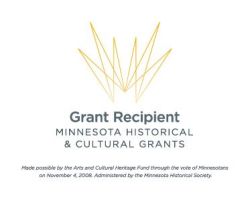So the 1862 annuity, on a train headed west toward Minnesota 150 years ago, was late. Why does it matter what was going on behind the scenes in Washington D.C. in 1862?
You’ve read part of the answer if you’ve had time to go through the Dakota War exhibit at MHS where a very large version of this primary source hangs on the wall: Nothing in history happens in isolation. Everybody makes self-interested decisions.
John C. Rudolph et. al to Alexander Ramsey August 14, 1862. State Archives. Governors. Ramsey. Letters Received Local Residents and Others
To his Excellency the Governor of the State of Minnesota.
Your memorialists, residents of Brown County Minnesota and residents of the Western Frontier Settlements adjoining the Dakotah — and Indian Territory, respectfully represent:
That the payment for the Dacotah — and Sioux —nation of Indians has this year been delayed up to this time. —
That said Indians considering said payment justly due to them and relying on the same for their subsistence, have become by such delay exceedingly exasperated, have committed several outrages, and threaten to overwhelm these frontier settlements with Indian Warfare. —
That your memorialists are in immanent danger, to see their families massacred by said Indians, if the able bodied men of these settlements should be removed from here under the militia draft, before said Indians are appeased by receiving what is justly due them. —
That rumor has spread here far and wide that the United States Government has paid the money in gold for said Indians long ago, but that said money has been corruptly misapplied in speculations on the discount between gold and paper currency and otherwise by the Hon. Clark W. Thompson Superintendent of Indian Affairs in the State of Minnesota, and that this is the reason of the delay of the payment.
Your memorialists therefore pray:
1) that the drafted militia from this part of the country may not be removed before the Indians have received their payments and are thereby appeased.—
2) that if Clark Thompson should not have received the money for the Indians, some of your memorialists may be authentically informed of that fact, so that thereby the fair reputation of Clark Thompson may be restored. —
3) that if said money should have been paid by the Government, as rumor goes, in that event a thorough investigation concerning the misaplication [sic] of the money may be instituted. —
Dated August 14th A.D. 1862
John C. Rudolph
John [Manderfelt?]
A. Strecker
L. Broumann
John Schneiter
D.G. [Millwall?]
Francis Erd
John W. [Horny?]
Fr. Beinhorn
Christian Prignit
Carl Schmidt
The August 2 and August 13 letters I supplied earlier in this series suggest that, not withstanding blanket condemnations, the OIA seems to have been trying to fulfill its obligation to make pay the cash portion of the 1862 annuity in gold. Was that motivated by self-interest, not altruism? Likely.
But juxtaposed on the secondary source stories that reduce the Indian System to a singular writhing mass of corruption, that is surprising: sometimes the self-interests of the officials and the interests of the Dakotas aligned. With his own reputation on the line, Mix held out for the gold Dakotas were rightfully due, not greenbacks valued 19% less.
But the Treasury argued the opposite: Traders ultimately will collect the annuity; they deserve no better than devalued paper currency. And by the way, if you haven’t noticed, we’re a little busy funding a war here; forgive us for not making your Indian warrant our bookkeeping priority.
In the August 14 letter, we catch a glimpse of how competing self-interests in D.C. played out on the frontier. New Ulmers wrestled with the annuity delay in the local context of an impending draft. They were not above citing the plight of their Native neighbors to forestall conscription. Altruism? Or self-interest?
Nor did they resist the opportunity to play politics and hold the feet of Republicans to the hot coals of responsibility for the annuity delay. Did they consider the self-interests of their audience, Ramsey, a Republican and former Superintendent of Indian Affairs? If they had, they might have tried a different approach if they needed the governor to take their concerns seriously.
Why Ramsey did not is another story.
*****
In the mean time, the stories go, a group of Dakota hunters were days into a hunting trip to the Big Woods. Before they left, their soldier’s lodge had enlisted the support of the head soldier of the white’s soldiers’ lodge, Fort Ridgely, that come payment time, he would support their plan to prevent the traders from collecting their impending annuity.
Curiously, they had not made a contingency for “what if the annuity never comes;” it called for Dakota soldiers balancing the traders’ books their own way when the annuity arrived. No one could tell them when that would be, so they did the next urgent thing: went out to hunt meat for their families. 150 years ago today they had not yet found any game.
In a few days, when they passed by Fort Ridgely again headed home, maybe they would hear that the annuity gold had arrived.

